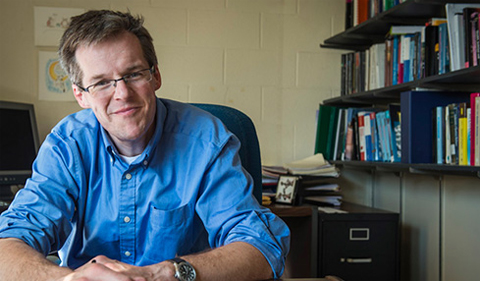Physics & Astronomy faculty are involved in developing a number of “curricular themes” at Ohio University.
Themes are clusters of courses and communities of students and faculty focused on interdisciplinary areas of interest. They represent a strategy that can be used by students to rationalize completion of the “breadth of knowledge” requirements for a College of Arts & Sciences degree. Plus they fill many general education requirements for students across Ohio University. This is achieved through a set of multi-disciplinary courses and extracurricular activities organized around a particular topic. Themes should thus include content from the humanities,
natural sciences, and social sciences.
Dr. Daniel Phillips, Professor of Physics & Astronomy, is the coordinator for the “Knowing the Future” theme. This theme collects a broad range of classes that teach and discuss the tools that are used to make predictions in disciplines from Physics to Population Biology to History. The theme also discusses how our ability to know the future is affected by our understanding of the present and the past.
 Epistemology is thus a key emphasis within the theme, and the hope is that students who sign up for the theme come to appreciate its crucial–if usually unacknowledged–role in our lives. Questions like “How do you tell fact from opinion?” and “Do numbers never lie” are discussed in the first-year class for all students in the theme called “Knowing What We Know.” The course examines the topics of knowledge, uncertainty, and prediction, and particularly how they arise and intersect in contemporary policy issues, societal debates, and state-of-the-art research.
Epistemology is thus a key emphasis within the theme, and the hope is that students who sign up for the theme come to appreciate its crucial–if usually unacknowledged–role in our lives. Questions like “How do you tell fact from opinion?” and “Do numbers never lie” are discussed in the first-year class for all students in the theme called “Knowing What We Know.” The course examines the topics of knowledge, uncertainty, and prediction, and particularly how they arise and intersect in contemporary policy issues, societal debates, and state-of-the-art research.
Through this, and other classes, the goal is that students in the “Knowing the Future” develop the skills to be able to make good predictions, understand which things can–and can’t!–be reliably predicted, and gain a deeper appreciation of the way in which we arrive at “knowledge.”
Dr. Eric Stinaff, Associate Professor of Physics & Astronomy, is a member of the Steering Committee for the “Fire to iPhone” theme. Human beings have always engaged in developing new technologies to improve their work, quality of life and relationships with others. Our culture speaks of “technology” as though it describes the most cutting-edgedigital inventions. And it does. But technology itself is nothing new. Humans have been developing new technologies throughout our history.
![]() This theme, through a variety of disciplines, traces progressions of key technologies across human history and critically investigates how those technologies have shaped society in the past and how new technologies might shape our future. From written language to the book to the telephone to GIS, students in this theme will explore questions such as:
This theme, through a variety of disciplines, traces progressions of key technologies across human history and critically investigates how those technologies have shaped society in the past and how new technologies might shape our future. From written language to the book to the telephone to GIS, students in this theme will explore questions such as:
- How and why do we create technologies?
- Why and in what contexts do we choose certain technologies?
- How have technologies (e.g. Twitter, texting) changed the ways we read, write, and communicate?
- How is technology blurring the boundaries between human and machine being? Is our immersion in technology transforming us into cyborgs?
- How does our culture construct technology, and how does that shape what we do with it?
There are other interesting possibilities for the Physics & Astronomy Department to be involved in other themes, e.g. “War and Peace” and “Sustainability Studies.” Faculty look forward to the opportunities that this initiative will provide for more Ohio undergrads to learn about science in general, and Physics & Astronomy in particular.



















Comments